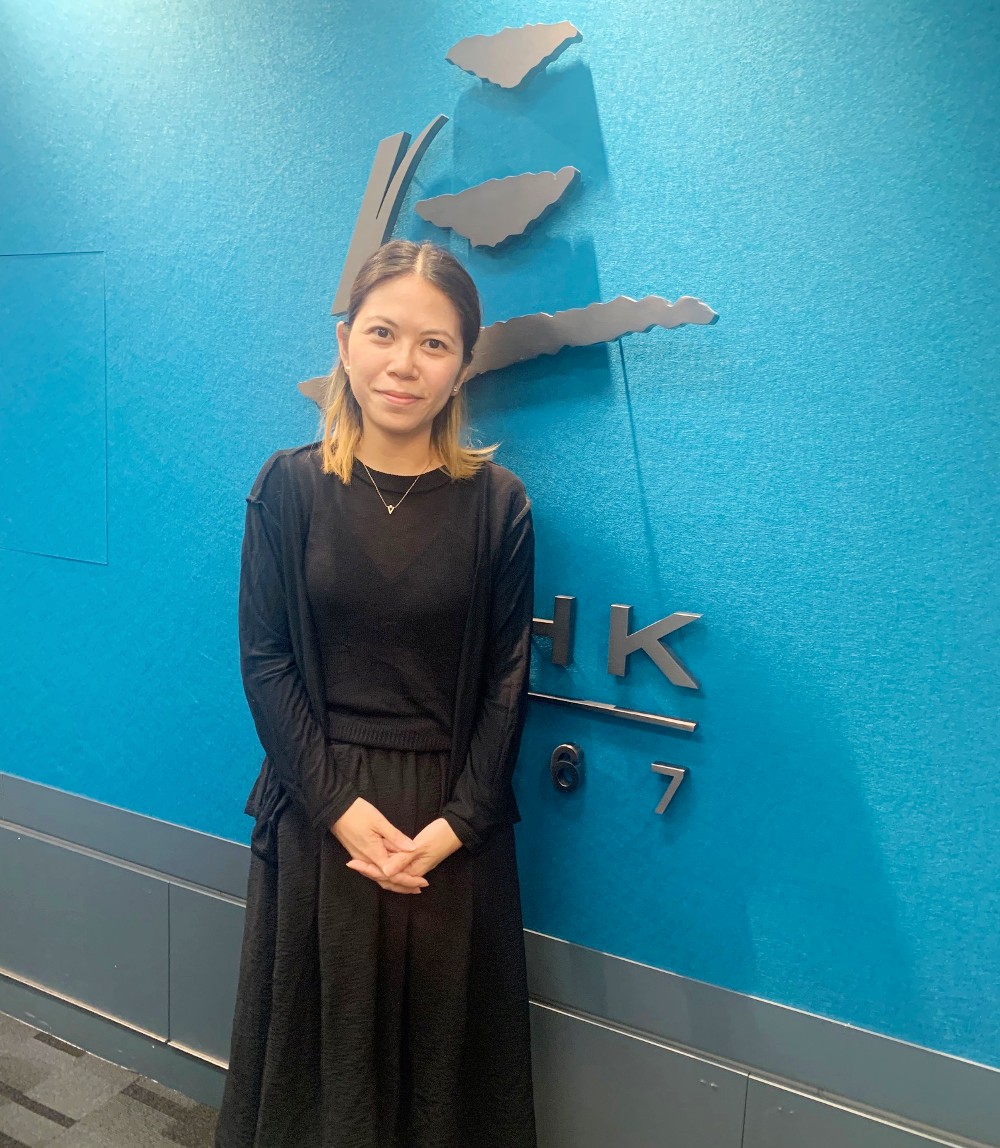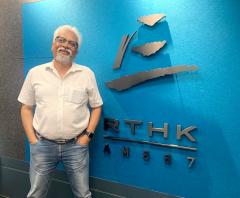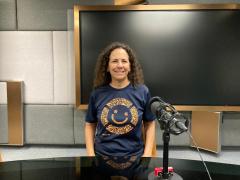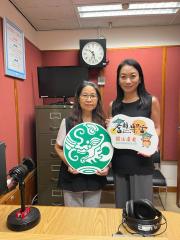簡介
Listen to #Hashtag Hong Kong every Sunday morning at 8.15
Focussing on issues affecting civil society, we'll hear from representatives of NGOs, associations, statutory bodies, and non-profit groups.
(Sundays 8.15am - 8.25am)
最新
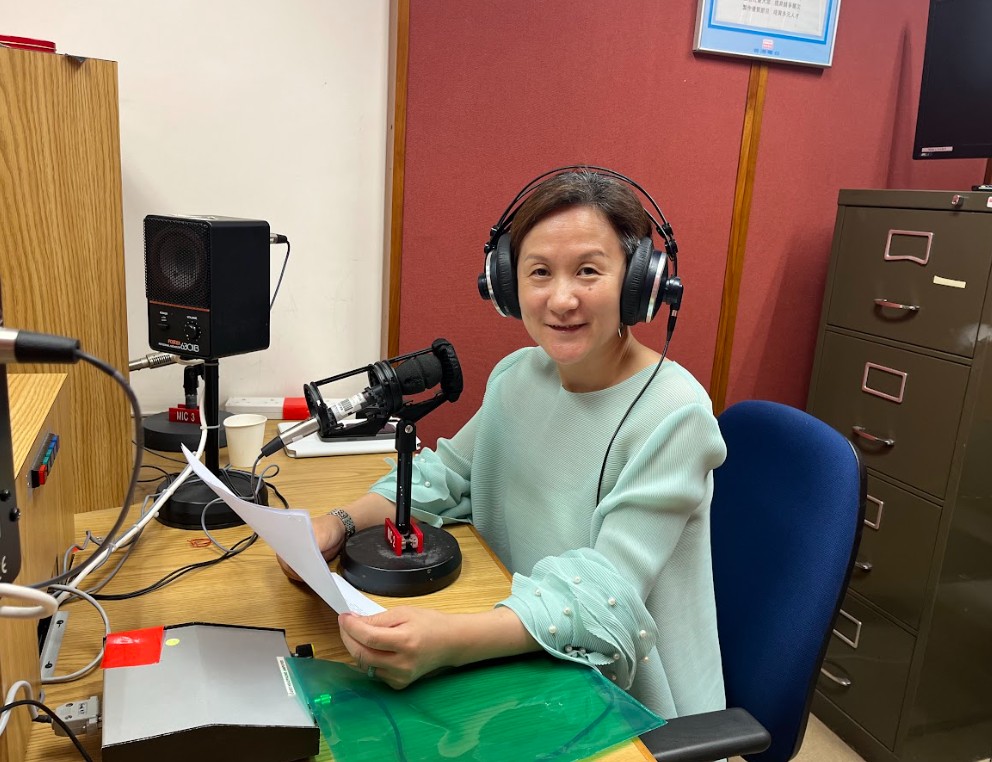
Vivian Lou, Director, Senior Citizen Home Safety Association
Good morning, everyone. I'm Vivian, Director of the Senior Citizen Home Safety Association and Professor in the Department of Social Work and Social Administration at The University of Hong Kong. Today, I’m going to share a little bit about a critical challenge facing Hong Kong's rapidly ageing population - the depression among older adults.
As you may be aware, Hong Kong is becoming an ageing society. More than 20% of our population is now 65 years old or above, and this percentage is expected to keep growing in the coming years. This demographic shift is creating significant challenges for our community, especially for our public health. One of the major issues is the high rate of depression among our senior citizens. Studies show that around 11% of Hong Kong's older adults suffer from at least one common mental health problem, and depression is a big part of that.
Why is this happening? The high rates of depression among older adults can be attributed to several key risk factors. Older adults often face multiple health challenges, ranging from chronic illnesses to physical limitations, which can significantly impact their mental well-being. Additionally, financial concerns, such as poverty and low income, can create significant stress and anxiety. Social isolation is another major contributor. Furthermore, the cognitive and functional declines associated with ageing can exacerbate feelings of helplessness and diminish an individual's ability to cope effectively. Even social culture could also be a factor that worsens the situation by discouraging older adults from seeking help. These factors can significantly impact an older adult’s overall well-being and quality of life.
Depression in older adults often presents differently than in younger populations. They may have common symptoms such as persistent sadness, anxiety, and difficulty concentrating. However, older adults are more likely to display cognitive changes and physical symptoms such as chronic pain or digestive problems, rather than the emotional symptoms we often associate with depression. This can make depression harder to diagnose and treat.
The good news is that there are effective ways to address depression in older adults. In addition to medication, community-based interventions and traditional practices like Qigong are often found to be effective approaches to treat depression in older adults. In Hong Kong, various local organisations are providing community-based mental health support to older adults. Let's take the Senior Citizen Home Safety Association's comprehensive 24/7 support service “Care-on-Call” as an example. This service has a team of registered social workers to take care of users’ emotions and mental well-being. We offer crisis assessment, emotional support, counselling, and information on community mental health resources. Through early screening and intervention, this service aims to prevent or alleviate the onset of major depression among older adults.
However, there's still a lot more that needs to be done. Given the rapid ageing of Hong Kong's population, the government may need to increase the availability of free or low-cost mental health services for older adults, so that more of those in need can access professional support. More resources for training social workers and healthcare professionals are also essential to better identify and manage mental health issues. Furthermore, the government should strengthen its collaboration with community organisations to focus on the mental well-being of our seniors. For example, they could encourage community centres and other groups to regularly host mental health talks and support groups, where older adults can come together, share, and find comfort in one another.
Ultimately, helping with depression in Hong Kong's ageing population is going to take a lot of different efforts. We need to make mental health less "shameful", empower communities, and ensure our seniors have the resources and care they need. It's a big challenge, but an important one we have to keep working on.
And to end on a positive note, I’d like to dedicate this song to all of you as I am a strong believer in the power of love. With love, we can! It’s called Ping Zhuo Ai by Julie Sue.
預告
Jamie Lau, Project Manager of Natural Parenting Network
Recently, the Equal Opportunities Commission released a report on breastfeeding at publicly accessible premises in Hong Kong. We from the Natural Parenting Network would like to share the challenges that breastfeeding mothers face and hope the public will better understand our needs and offer support and respect.
Breastfeeding not only benefits babies and mothers, but also families, and the workplace, as well as the society ultimately.
The success and sustainability of breastfeeding depend not only on the effort of mothers and babies but also how the support from their environment: the attitude of family members, societal views, the workplace arrangements when mothers return to work etc.
Breastfed babies receive natural antibiotics and other life-immune contents, especially during their vulnerable period before the age of 2. This reduces the risk of babies getting sick or hospital admissions, which subsequently decreases the need for parents to apply for leave to take care of their children. Parents then can focus more on their work and have high productivity, which is a win-win situation for the new families, organization and society.
Apart from physical benefits, breastfeeding also helps mothers and babies establish a close bond and attachment, leading to better emotional and brain development. Therefore there is an essential need for social support for breastfeeding families.
We realized that mothers are facing some difficulties:-
1 . Although many public venues provide baby care or nursing rooms nowadays, the number of facilities provided is far less to meet the demand. There may be 1 or 2 nursing rooms if lucky or it maybe only available on certain floors). But the number of families visiting the venue is not 1 or 2! We can imagine when a baby shows their early hunger signal, mothers need to find their way to the baby care facilities, which may take a 10-minute walk, only to find the room may be occupied, leading to a further waiting of 30 minutes or more.
2. Some nursing areas are designed to share with baby-changing stations. This would lead to a longer waiting time and queue for those who have real needs.
3. Sometimes misutilization occurs such as people occupying the nursing room for bottle/ formula feeding babies, having lunch, or other uses rather than breastfeeding! Some facilities management offices may lock the room for better control and avoid the above occurrence. When mothers reach the nursing room, they need to call the management office and wait for them to unlock the room. It is very inconvenient indeed and the purpose of establishing a breastfeeding room cannot be fully utilized.
The availability of breastfeeding facilities is only one of the difficulties that mothers face. There is also a lack of awareness and acceptance of breastfeeding. People think it’s just the same between breastfeeding and formula feeding and even may stop mothers from breastfeeding in open areas such as shopping arcades, restaurants, and parks etc. They even ask mothers to feed their babies in the washroom, which is inhumane. This can deter mothers from bringing their babies out even for a walk.
On the other hand, there are only guidelines issued by the government but not ordinances to monitor employers to provide certain designated breastfeeding periods and spaces. Therefore apart from families visiting public venues having their needs for breastfeeding facilities, some working mothers need to pump or express breastmilk at nursing rooms near their workplace, which increases the need for certain amount of breastfeeding rooms.
There is an increasing need for breastfeeding facilities in public and government premises. Government legislation on breastfeeding facilities requirements in newly built and refurbished premises can absolutely help to fulfil the demands. Relative stakeholders shall put an effort into supporting breastfeeding families. The developers can arrange breastfeeding facilities by re-arranging shops/ office areas in their existing premises, placing portable cube breastfeeding rooms can already help a lot. We think it is a social responsibility to offer support and respect to breastfeeding mothers.
The above-mentioned hindered mothers' continuous breastfeeding, especially after getting back to work. The attitude of the people around them is very important. How the public reacts to breastfeeding strongly affects mothers’ confidence and minds in sustaining their breastfeeding journey. We would recommend the government to promote and educate people that “breastfeeding is just that normal”, breastfeeding mothers are deserved to be respected and accepted. Mothers have the right to breastfeed their children anytime anywhere, even the breastfeeding facilities are not available, without being stared by strange eyes.
There are resources in the society that support breastfeeding mums. We are breastfeeding mothers and we provide peer support to expected and post-natal parents, the “Breastfeeding Peer Counseling Program” (in short “BFPC) is commissioned by the Department of Health. We organize workshops and deliver correct breastfeeding information via social media like Facebook, Instagram, WeChat, and YouTube. Mothers can also raise their enquiries by reaching out our hotline and WhatsApp group services.
Moreover, we recommend mothers download the mobile app “ Breastfeeding GPS” so that they can obtain the location of breastfeeding facilities nearby when they are going out with their babies or there is a need for a place for milk expression during work or away from their babies.
This morning, I’d like to dedicate the song Never Grow Up by Taylor Swift to all of you listening. Enjoy and Thank you
重溫
Paul Chan, Co-founder and CEO of Walk In Hong Kong
World Heritage Day 2024 marks on 18th April. The significance of this occasion resonates deeply within me. Beyond its global celebration of heritage conservation, this day serves as a call to action for communities worldwide to reaffirm our dedication to protecting our heritage and cultural identity. Today, I'm compelled to share my thoughts not just as a seasoned heritage and cultural tour operator, but also as a passionate advocate for the preservation of our city's rich heritage and culture.
Heritage transcends mere buildings and historic sites; it embodies the essence and identity of a city, weaving together the stories and memories of generations. Whenever I lead heritage tours and delve into the archives of old Hong Kong photographs, a profound sense of nostalgia washes over me. When I saw old pictures of the elegant colonial architecture of Central, the charming row of walk-up shophouses of Kowloon, or the rustic beauty of the New Territories – these are not mere structures but repositories of our collective history and livelihood. Sadly, many of these architectural gems have succumbed to the pressures of rapid urbanization and development.
Witnessing the loss of our heritage is truly heartbreaking, as each demolition represents a potential loss of our remaining sites if we do not take decisive action. Once these architectural marvels are gone, they cannot be replaced, and with their disappearance, we lose a vital part of our cultural identity. Missed opportunities to leverage our heritage as a unique selling point for our city are evident, especially as we work towards revitalizing our tourism industry
post-pandemic. Nevertheless, there is still time to effect change. Transitioning into a heritage advocate has led me to frequently ponder the relevance of my cause. To me, the answer is clear – we have a duty to conserve what makes our city exceptional. In a world saturated with standardized attractions and tourist traps, our heritage stands as a beacon of authenticity and uniqueness.
Safeguarding our heritage is imperative if we wish to maintain our status as a leading tourism destination."
That is the major reason why we launched the conservation campaign to save the State Theatre, the largest surviving standalone theatre building on Hong Kong Island. During the campaign, we've adopted a comprehensive approach with the hope of enhancing the survival chance of this building. Not only did we successfully lobby the theatre from a Grade 3 proposed Historic building status to that of Grade 1, but we also enhanced the public’s emotional attachment to the
site through talks, walking tours, and interviews, etc. To this day, we persist in refining our strategies to strike a balance between conservation with economic sustainability.
We know that heritage conservation isn't just about preserving physical structures; only by also excavating its stories and memories can we truly preserve the spirit of a place. That is why we have produced To Be Continued, a documentary which chronicles the life and legacy of State Theatre’s founder, Harry Odell, the first impresario in Hong Kong, whose relentless efforts to invite best performers from the world to Hong Kong has made our city already a “East-meets-West centre for international cultural exchange” in the 1950s.
We also recognize the crucial role of integrating heritage with sustainable tourism as a way to deepen our present connections to the past. As part of this recognition, we have launched a tourism innovation project supported by the Countryside Conservation Funding Scheme. Our project aims to revitalise the villages of Sha Tau Kok and Yan Chau Tong areas by introducing immersive and sustainable tourism experiences in their Hakka villages. By leveraging the rich heritage of Hakka houses and the picturesque village landscapes, we curate unforgettable experiences such as seasonal dining against the backdrop of a majestic Hakka mansion. These immersive experiences enable both visitors and locals to connect with and embody the stories, memories, and rituals, thereby passing on the spirit of the past and its cultures to the present. We firmly believe that such emotional encounters are integral to our ongoing efforts to advance the cause of heritage conservation.
As the Chinese proverb wisely reminds us, "A journey of a thousand miles begins with a single step." Next Thursday, on 18th April, I encourage you all to think about the ways we can increase awareness regarding the preservation of important monuments and cultures. Perhaps the most straightforward way to celebrate one’s cultural heritage on World Heritage Day is by authentically living one’s life in a way that embodies who we are and where we come from, but we can also think of the little ways we can protect our shared heritage and humanity. Look online to see if any community events are going on in the city that tell stories about our surroundings. Spread awareness by posting pictures of little-known historical sites on social media. World Heritage is about the humanity and stories we share, and our collective responsibility in keeping these stories and sites alive.
I urge you all to join me in this journey to protect and preserve our heritage. Let us celebrate our past, embrace our present, and safeguard our future.





